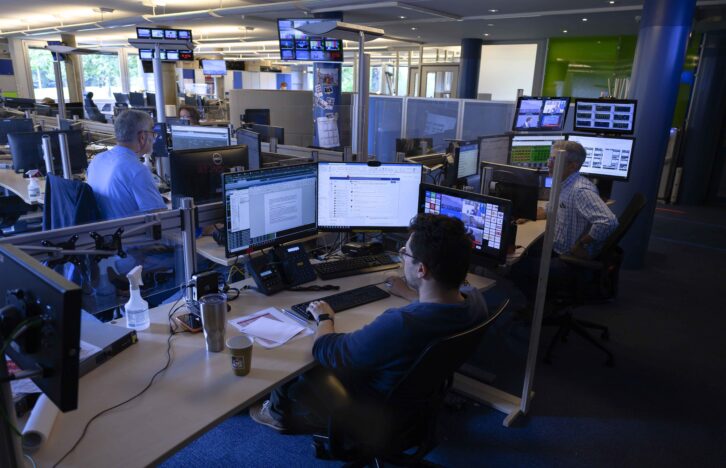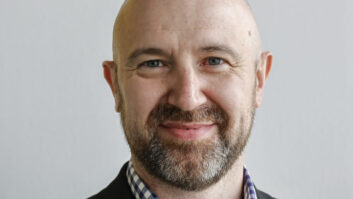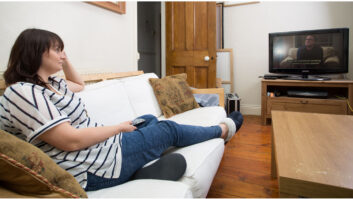The EBU’s Eurovision News Exchange has been providing TV, radio and sports news to member broadcasters and sublicensees for over 60 years.
Operating in over 50 countries, the Eurovision News Exchange shares live and edited news; provides global coverage through access to third-party content; includes verification and clearance of social media content; and enables digital news recommendation and monitoring tools.
The biggest exchange of its kind, Eurovision News delivers more than 120 different items on a daily basis, whether that’s breaking news or feature material from EBU members that is then sent out to the network.
But it’s not just broadcasters that contribute content to the Eurovision News Exchange, explains Liz Corbin, deputy media director and head of news at the European Broadcasting Union: “We hold some collective bargaining contracts on behalf of our members in order to provide a global service, and we also welcome what we call sublicensees of the News Exchange, including NHK in Japan, ABC in Australia, and the US pool, which comprises CBS, NBC and ABC. They give us access to their pool and in return, they get access to European content.”

Operating out of the EBU’s headquarters in Geneva, the Eurovision News Exchange also has staff in Moscow dealing with Russian content, a team in Washington DC, and another team in Rome, where it has strong connections with Vatican Media. “At any one time, the minimum number of staff we need to operate on is four or five people, but it’s a 24/7 service,” adds Corbin. “Often, when we have visitors in the newsroom, they’re surprised by how small the team is because the amount of content that’s coming in and being produced is so large. The beauty of the Eurovision News Exchange is that there’s somebody in every member broadcaster producing that content. We add and refine scripts etc, but a lot of the work is done by the members.”
To deliver all of that content to members and licensees, the Eurovision News Exchange employs a unique system. Edited content is essentially a file upload system, where broadcasters contribute the pictures, script, and metadata together. That’s picked up by the team in Geneva where it’s processed and then sent out digitally to everyone else. The software-based News Exchange Platform, launched earlier this year, enables members to receive the material directly into their media asset management system, critical for a fast-paced newsroom.
Satellite or IP?
For live contributions, the Eurovision News Exchange employs a European satellite-based system, which enables a broadcaster, for example ZDF in Germany to uplink a live signal from their headquarters that other EBU members can then take directly off the satellite. “We have three live satellite channels, which is more than any of the agencies,” adds Corbin. “Satellite still remains the most reliable technology. It’s the hardest to break or interfere with, and as public service media, our members take the reliability of the system incredibly seriously.
“It is expensive, and we are looking into new solutions for the future, but satellite remains quite important until a secure and reliable system that can’t be interfered with is found. If we have an internet breakdown in the office in Geneva or at one of the broadcasters across Europe, we can manually playout recorded content and live content on satellite channels. If you’re 100 per cent dependent on IP distribution, it’s much harder.”
Broadcasters have been facing multiple challenges in recent years, from the rise of so-called ‘fake news’, to interfering governments and ever-decreasing budgets. But one of the biggest challenges facing any newsroom is the rate of change in terms of technology. Even in the past three years, broadcasters have realised how something like remote production can help them save money, time and travel, as well as deliver their content across numerous outlets.
“Increasingly, our members are delivering their best journalism not just in a TV news format, but in amazing, new digital formats, whether that’s on social media or an interactive experience on their website, or however they’ve optimised it for their apps,” explains Corbin. “What the EBU has always been about is making sure that members benefit from being part of this club, and so we share content between us because members are not strictly speaking in competition with each other.”
Eurovision News is now experimenting with an exchange of digital content. Corbin explains: “All of the online content from over 30 members of the EBU is now aggregated through an API. We’ve developed a translation tool called EuroVox, which uses AI to detect the best translation engine between the two languages you’re trying to translate, and it automatically translates everything into English and on demand into 18 other languages. So journalists in newsrooms across our membership can read content from Finland, Spain, Germany, Italy, Cyprus, etc. in the language of their choice.”
“Beyond this, 18 public service news organizations are now publishing each other’s content in their own language. For example on the news homepage of RTE in Ireland, or FranceInfo you can read content from 14 other countries, all in English or all in French.”

Technology can help broadcasters in many other ways, particularly in the expensive area of distribution. The EBU has been working on how to do that more efficiently itself, but Corbin says there’s a strong desire to receive assistance from outside of the organisation. “We work with a lot of event organisers, and, obviously, their priority is to get their story out and get coverage for their event. But actually, there are not many platforms that allow you to download content, stream or have photo galleries.
“We do have a system called Eurovision News Direct, which we developed with an external company, and it allows you to download video in the quality that you want. If you’re a TV broadcaster, you need it in the highest HD quality, but if you’re posting it on your website or on social, then you don’t need that so you can do it a bit quicker,” she adds.
One of the big advantages of News Direct is that it auto-transcribes content, so when a journalist receives a flash mentioning President Biden talking about his relatives in Ireland within an hour-long speech, they can search Biden and Ireland within News Direct and find the exact clip they need. “We use it when we have event clients because then we can open it to everybody,” explains Corbin. “It’s not just available to EBU members, but newspapers and websites that are increasingly including video content.”
The rise of AI
There’s also a discussion to be had about artificial intelligence and how it can help journalists. It’s something that the EBU is looking at in terms of its potential for public service media newsrooms in particular and how they are going to manage it.
“We’ve talked about how AI can help with automatic translation and recognising pictures to help create a shortlist,” states Corbin, “which is a very manual job for all of our members. The big thing for us is that as soon as you introduce a tool like that, people get over-dependent and don’t check it. So the systems have to be in place to make sure a human is actually the last person that deals with the content and that you can really see how it can save time and energy and allow you to redirect that elsewhere.”
Artificial intelligence is likely to be a hot topic at the EBU’s conference for the international news industry in June. News Xchange is taking place in Dublin between 19th-20th June, and speakers include Leo Varadkar, taoiseach of Ireland, and former UK prime minister Liz Truss.
“I think both of them are pretty engaging speakers,” says Corbin. “Obviously, we’re in Ireland so we’re delighted that Leo Varadkar has agreed to join us. Liz Truss had the most extraordinary story in the autumn of 2022. She will tell us what she thinks about the news media, and we will be able to pose questions to her, so that will be impossible to miss.”
The theme of the event is the front-line news, which has led to Corbin thinking about a recent Oscar-winner. “I kept seeing all of the hype about Everything, Everywhere, All at Once and that just feels like my life!” she laughs. “News at the moment means you have to be everywhere all at once.”







